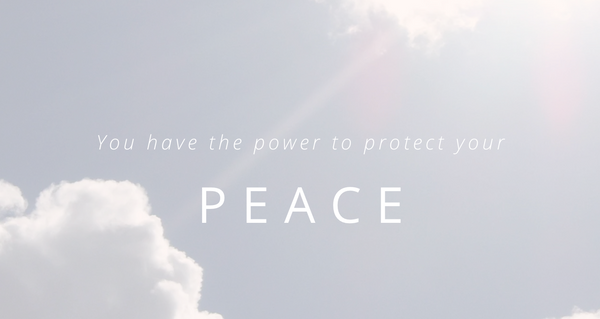
Embracing Boundaries for Stronger Relationships
Have you set boundaries with someone, only to feel an overwhelming wave of regret 5 minutes later? Setting boundaries—whether at work, with your partner, with friends, or family—is an essential part of self-care.
But is it possible to create boundaries without feeling guilty?
____________________________________
It’s completely normal to experience discomfort when setting or reinforcing boundaries 🚫. Guilt can creep in when we realize we are the ones enforcing it, and we can become fearful of causing someone else’s unhappiness.
The good news is there are ways to minimize the guilt, manage it, and even become comfortable with it, so you can uphold your boundaries with confidence 🎊.
But how do we do it? 🔍
First, let's understand why we feel guilt in the first place.
Society Teaches Us That Prioritizing Ourselves Is Selfish ❌
Many of us were raised to believe that prioritizing our needs is selfish. From a young age, we're taught to accommodate others, often at our own expense, to be seen as “good” or “kind." The truth is, setting boundaries is not about being inconsiderate of others, it’s about preserving our well-being 🌈.
When we set clear, direct, loving boundaries, we prevent resentment from building and create healthier, open and more compassionate relationships.
Fear of Judgement & People Pleasing 😨
Worrying about what others think is deeply ingrained in many of us. If you’re a people-pleaser, you might struggle with saying no, and worry that it makes you come across as unreliable or unkind. You may feel the need to justify your decisions, even when they are completely reasonable.
But avoidance is not the path to deep, meaningful relationships. True connection comes from honesty and mutual respect, not from self-sacrifice.
Unhealthy Family Dynamics 👎
Many of our boundary issues stem from childhood. In some families, boundaries barely exist, with the expectation to meet everyone’s needs without question. If you grew up in an environment where personal boundaries were ignored or dismissed, enforcing them as an adult is incredibly uncomfortable.
When family push back against your boundaries, you may hear things like:
-
○ “Why can’t I call you every day? X speaks to their mum that often.”
○ “I understand that you want to do X, but you shouldn’t miss this event.”
○ “Can’t you reschedule? You know we always have dinner on Thursdays.”
Learning to say no and standing firm can be challenging, but doing so is the key to maintaining healthy relationships and emotional well-being.
Healthy Boundaries & Their Benefits
Boundaries don’t push people away, they bring people closer together. Without them, relationships can become filled with resentment, frustration, and exhaustion. When you set boundaries, you create space for genuine connection based on respect and understanding 💞.
Failing to set boundaries can lead to losing a sense of your true self. When you learn to ignore your needs to accommodate others, you may feel disconnected, isolated, or inauthentic. By asserting your needs, you affirm your self-worth and foster genuine relationships.
How To Set Boundaries Without Guilt
Remember the Consequences 💭
It’s easy to dwell on potential problems or conflicts that might come up when enforcing a boundary, but it’s crucial to remind yourself of the toll that weak or nonexistent boundaries take on your mental and emotional health.
Are you feeling stressed 😰, overwhelmed, burnt out 🪫, or resentful? If so, your fear of discomfort might be keeping you back. Would you rather deal with those feelings indefinitely, or face temporary guilt to achieve long-term peace and happiness? The choice is yours!
Differentiate Between Healthy Boundaries & Selfishness ⚖️
Consider this: Are you setting a boundary because you’re demanding something from another person, or because you’re clarifying what you will and won’t tolerate?
Healthy boundaries focus on you as the subject, not on controlling others, and they define how you'll respond if someone crosses that boundary.
The point of setting boundaries isn’t about taking from others—it’s about protecting your emotional energy in order for your relationships to grow and flourish.
Set Boundaries When You're Calm ☮️
Setting boundaries before reaching an emotional breaking point is optimal. When emotions build up, boundaries can come across as aggressive rather than assertive. If you approach boundary-setting from a calm 😌, thoughtful place, the person on the receiving end will likely feel less attacked, respond with less defensiveness, and you will feel less guilty.
Face Your Feelings 🪞
People are taught to suppress their emotions to “keep the peace,” but this only leads to bottled-up frustration, resentment, and anger. Instead, try confronting your emotions head-on.
Practices like meditation 🧘, therapy, journaling ✍️, self-reflection and exercise 🏃, can help you tolerate and understand your emotions rather than fear them. When you stop avoiding your feelings, you gain clarity about what boundaries are necessary for your well-being.
____________________________________
Setting boundaries isn’t about being harsh or unkind, it’s about valuing yourself and your relationships. It’s okay to feel uncomfortable at first, but don’t let guilt dictate your actions. The more you practice, the more natural it will feel, and the healthier your relationships will become 🌞.
So next time you set a boundary and feel guilt creeping in, remind yourself: you are not responsible for managing other people’s emotions at the expense of your own happiness!

